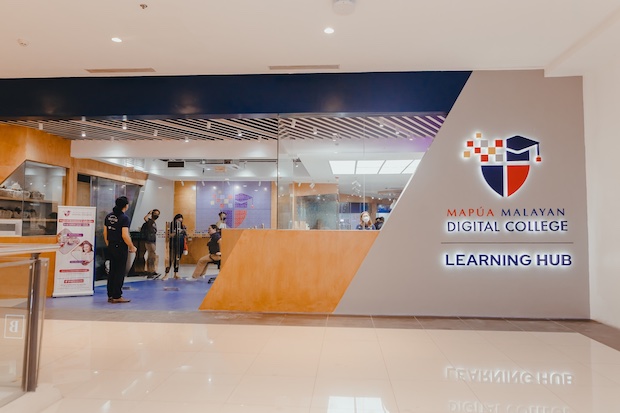
Photo from the Facebook page of the Mapua Malayan Digital College
MANILA, Philippines — As the basic education sector studies to innovate the learning process through the use of technology, some private schools in higher education have started exploring a fully digital setup for students.
At Mapua Malayan Digital College (MMDC), the approach is not like traditional online learning where teachers deliver the lectures through real-time virtual classes as they give prompts, problems, and cases instead.
Derrick Latreille, chief learning officer of MMDC, said their model is unique because they don’t have regular classes.
Each week, the students have a scheduled meeting where they can discuss how the teachers could help and monitor the progress of their projects and cases they are working on.
“We have a team that delivers examples, instructions, videos, and all the books that are digital, and all the content you would need to guide you through the project,” he told the Inquirer.
Lizamarie Olegario, an associate professor at the University of the Philippines College of Education, described MMDC’s approach as problem-based or project-based learning, an “ideal” setup that “the basic education sector should learn” to implement.
Latreille cited an example of a prompt under a mathematics general education course where students would think like a mathematician in 1602.
“They’re facing the story of a pandemic but it happens in 1602 and they’re mathematicians. The governor is coming to them [asking] why people are dying and they’ve got to analyze data that’s coming in as if they collected them in 1602,” he said.
The story will evolve about every two weeks and the students would need to solve new problems from pre-algebraic topics to understanding parabolas and equations of parameters.
“We’ve shown them the real application of things … So that’s how math in the modern world [works], we made it relevant in the project problem case [approach],” Latreille said.
In case the students want to meet with their peers to work on projects, MMDC, a Commission on Higher Education-accredited institution, has set up a learning hub in Quezon City which, according to Latreille, looks like a “coworking space.”
Through the course of the study, if the student would need a professor’s help to navigate the content, they could message the teacher to schedule a one-on-one meeting.
“Our professors are designed to be coaches, mentors, not really lecturers. The professors spend more time one-on-one or in small groups than they will in any kind of group setting and that’s because their role as a coach is as a mentor,” Latreille said.

